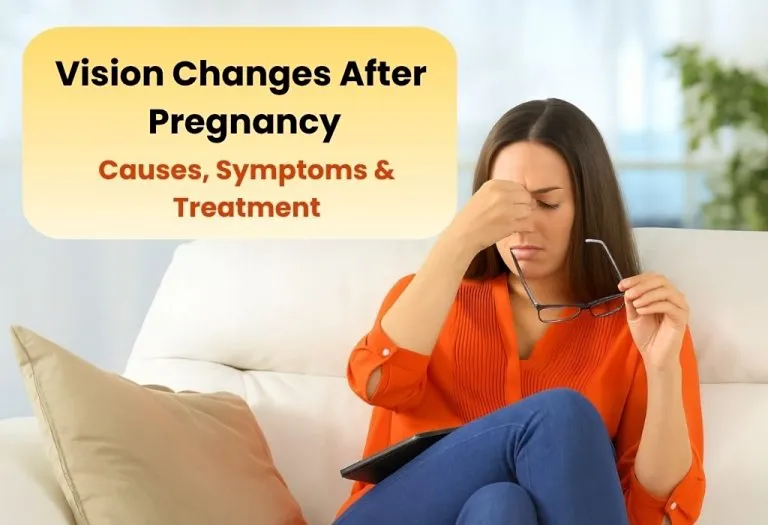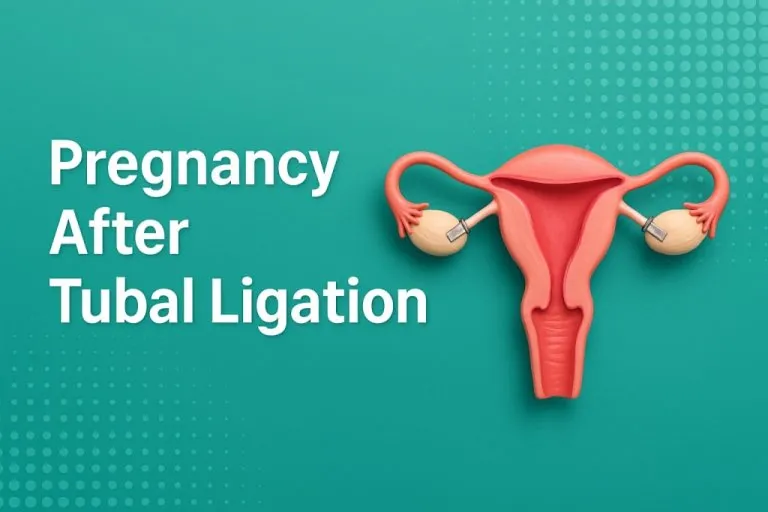Vision Changes After Pregnancy – Causes, Symptoms and Treatment

A woman’s body undergoes many changes during and after pregnancy, and hormones are responsible for these changes. One such change that most new mothers would notice is related to their vision. Changes in hormone and fluid levels in your body can affect your vision. About fifty percent of pregnant women are prone to these changes. While you may have noticed changes in your vision in the second trimester, they become more prominent in the third trimester and postpartum. Hormonal changes can also lead to dry eyes after pregnancy, even blurry vision after childbirth. Most of the changes abate and your vision becomes normal, but after a few months of childbirth. Here’s all you need to know about vision change after pregnancy.
What Causes a Change in Vision Post Pregnancy?
Blurred vision is a pregnancy symptom caused by hormonal changes. However, a change in vision may also be due to a cause not related to pregnancy. Hence, you should consult an optometrist.
Some of the causes of vision changes post-pregnancy include:
1. Preeclampsia
Preeclampsia is a condition that occurs during pregnancy. In this condition, a woman has high blood pressure and her kidneys function abnormally. High blood pressure during pregnancy can cause CNS irritation or cerebral oedema, and hence, you may have blurred vision (1). It is recommended that you visit your gynaecologist to keep your blood pressure in check.
The American Academy of Ophthalmology (AAO) indicates that approximately 25-33% of women with preeclampsia experience vision issues (2). Research published in the journal Obstetrics & Gynaecology points out that preeclampsia, especially in its severe or early-onset forms, is linked to a heightened risk of maternal retinal conditions in the years following pregnancy (3).
2. Gestational Diabetes
The blood sugar levels of women with gestational diabetes keep fluctuating during pregnancy. Due to this constant change, the blood vessels attached to the retina may get damaged. This can affect eyesight and cause blurred vision (4).
3. Pituitary Adenoma
The formation of a tumour in a woman’s pituitary gland may alter hormone secretion and lead to vision problems. This, however, is a very rare problem.
5. Lower Fluid Retention
After giving birth, the fluid-retention capacity of a woman’s eye ducts decreases. This can alter the cornea’s shape, leading to blurred or distorted vision.
6. Hormonal Fluctuations
Pregnancy leads to significant hormonal changes in the body, which can affect the eyes and vision. These hormonal fluctuations can lead to temporary changes in vision, such as blurred vision or dry eyes.
Symptoms of Vision Problems After Pregnancy
Some of the symptoms of postpartum vision loss or eyesight change after pregnancy include:
- Sensitivity to light – Bright lights may irritate your eyes.
- Dizziness – Blurred vision may lead to dizziness and nausea.
- Double vision – Outlines may seem blurred, and you might see images overlapping.
- Intermittent blur – This can occur occasionally, causing certain things, like road signs, to appear blurred.
- Strain on eyes – Your eyes will feel tired and stressed all the time.
- Flashes and floaters – Bright flashes of light or wavy lines in your vision may appear due to retinal detachment, caused by straining during labour.
How to Treat Postpartum Vision Problems?
Postpartum vision problems rarely cause permanent vision changes after pregnancy. Many of the changes can go back to normal a few months after the baby is born. But in a few women, this warrants a new prescription due to permanent changes in vision.
Here are a few treatment options for postpartum vision problems:
1. For Dry Eyes
Dry eyes can be a major cause of blurred vision. You can fix this by using saline drops, like those used by contact lens wearers. You can also get eye drops prescribed by an ophthalmologist and use them (5). Do not buy over-the-counter drops, which may worsen your condition. Staying away from over-the-counter and unprescribed medications is necessary.
2. For Blurred Vision
Blurred vision often resolves after pregnancy, but if it persists, see an ophthalmologist for an eye exam. If blurred vision continues for over 6 to 8 months, it may be time to consider a new prescription.
3. For Preeclampsia
Preeclampsia or high blood pressure, as mentioned, can affect the retinal blood vessels and cause vision problems. Hence, it is important that you visit your gynaecologist to keep your blood pressure in check during pregnancy. You may be prescribed corticosteroids or anticonvulsants.
4. For Gestational Diabetes
Blurred vision can also be due to an inherent diabetic condition. The first step is to switch to a healthy diet and lifestyle to avoid the risk factors of gestational diabetes. Gestational diabetes happens to pregnant women. Post-pregnancy, you can maintain a healthy lifestyle to stay fit. However, if you already have high sugar levels, your gynaecologist can prescribe medications to keep them under control.
5. Addressing Permanent Vision Loss
Vision changes post-pregnancy are common, but they are not always due to hormonal changes during pregnancy. It is important to note that these changes may not have been a part of pregnancy at all. Hence, it is important to visit an ophthalmologist for an ocular examination about two months after childbirth if you notice persistent changes in vision. You may be prescribed new glasses or contact lenses.
How to Prevent Vision Change After Pregnancy?
Maintaining good eye health during and after pregnancy is important. While some postpartum vision changes can be common due to hormonal fluctuations and other factors, there are steps you can take to minimize the risk of significant eyesight changes after pregnancy. Here are some tips:
- Regular Prenatal Care: Attend all prenatal check-ups with your healthcare provider to monitor any potential health issues that might affect your vision.
- Manage Gestational Diabetes: If you have gestational diabetes, work closely with your healthcare team to keep your blood sugar levels under control, as high blood sugar can impact vision.
- Stay Hydrated: It is very important to stay well hydrated for overall health, including eye health. Drink plenty of water throughout pregnancy.
- Eye Protection: Wear sunglasses with UV protection to shield your eyes from harmful UV rays when outdoors.
- Maintain a Balanced Diet: Consume a diet rich in antioxidants, vitamins, and minerals, which can support eye health. Include food items like fish, carrots, and leafy greens in your diet.
- Limit Screen Time: Reduce eye strain by limiting screen time and taking frequent breaks when using digital devices.
- Regular Eye Exams: Schedule regular eye exams with an optometrist or ophthalmologist before, during, and after pregnancy to monitor your eye health and address any issues promptly.
- Report Changes: If you notice any sudden or significant changes in your vision during or after pregnancy, consult with an eye specialist immediately.
When to Consult the Eye Doctor?
Consult an eye doctor immediately if you experience any of the following postpartum eye issues (6):
- Sudden, severe vision loss.
- Persistent blurry or distorted vision.
- Flashes of light or new floaters.
- Pain or redness in the eyes.
- Double vision that doesn’t resolve.
- Any other concerning or unusual visual symptoms.
FAQs
1. How long does it take for vision to return to normal after pregnancy?
Most women notice their vision gradually returning to normal within a few weeks to a few months after giving birth. Once hormone levels stabilize and the body recovers from pregnancy, eyesight usually returns to its pre-pregnancy state (7).
2. Are there any long-term effects of pregnancy-related vision changes?
Typically, vision changes during pregnancy are temporary and do not cause long-term damage. That said, it’s important to schedule an eye exam to ensure there are no underlying issues (5). Conditions like gestational diabetes or preeclampsia can have ongoing effects if left untreated.
3. How can pre-existing eye conditions influence vision changes during pregnancy?
If you already have an eye condition, hormonal and fluid changes during pregnancy might make symptoms more noticeable or temporarily worsen them. Consulting an eye specialist can help monitor your eye health and manage any issues effectively during this period.
4. How can pre-existing eye conditions influence vision changes during pregnancy?
If you already have an eye condition, hormonal and fluid changes during pregnancy might make symptoms more noticeable or temporarily worsen them. Consulting an eye specialist can help monitor your eye health and manage any issues effectively during this period (8).
5. Are some women more likely to experience vision changes during pregnancy?
Yes, vision changes don’t affect everyone equally. Around 15% of pregnant women experience them, often mildly and without serious consequences. Still, if you notice any unusual vision problems, it’s wise to get a professional eye check to rule out other medical causes.
Pregnancy-induced vision changes may be due to various reasons. It may also scare many women, but remember that there are ways to overcome this. Being informed about it is the best way to deal with the problem, so you can consult a doctor in time.
Also Read:
Postpartum Insomnia
Postpartum Backpain
Postpartum Urinary Incontinence
Hormonal Imbalance after Pregnancy
Was This Article Helpful?
Parenting is a huge responsibility, for you as a caregiver, but also for us as a parenting content platform. We understand that and take our responsibility of creating credible content seriously. FirstCry Parenting articles are written and published only after extensive research using factually sound references to deliver quality content that is accurate, validated by experts, and completely reliable. To understand how we go about creating content that is credible, read our editorial policy here.
1. PubMed Central – Pregnancy and the Eye
2. American Academy of Ophthalmology – Ocular Changes in Pregnancy
3. American Optometric Association – Preeclampsia, years later, still takes toll on women’s eyes
4. MedlinePlus – Gestational diabetes
5. Cleveland Clinic – Blurry Vision While Pregnant
6. CDC – Signs and Symptoms of Urgent Maternal Warnings Signs





































